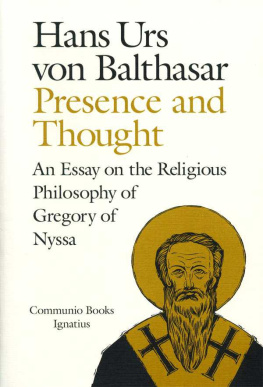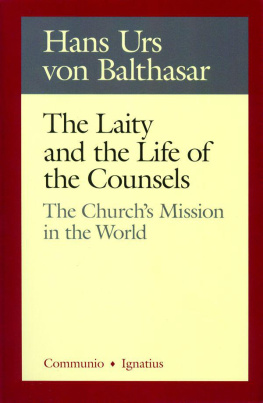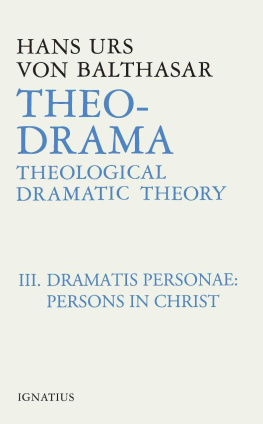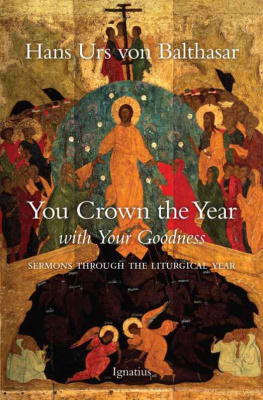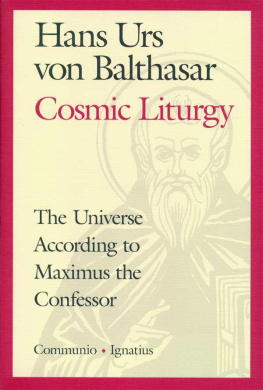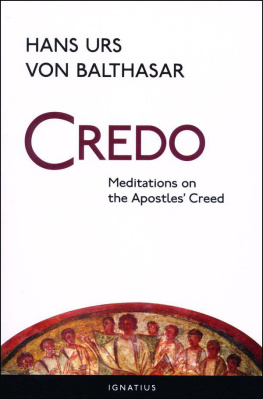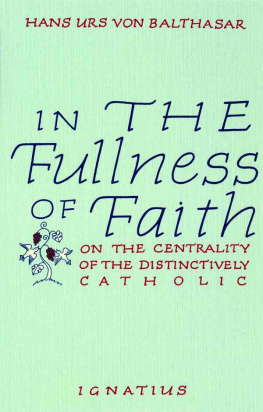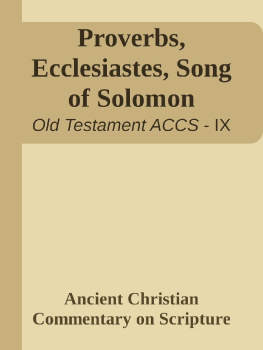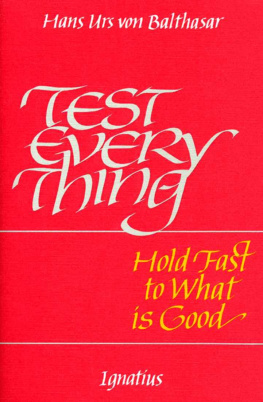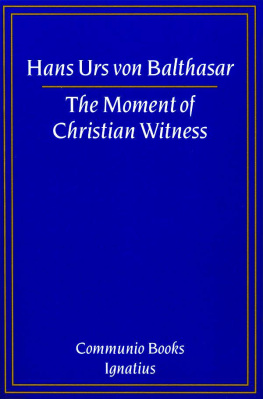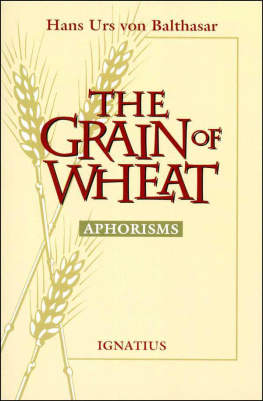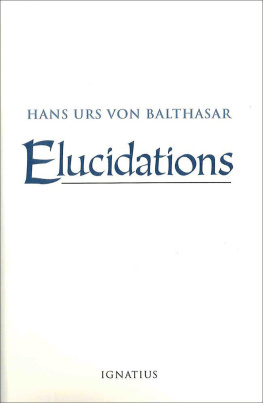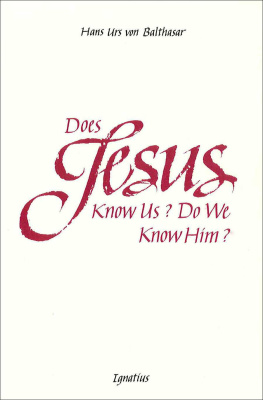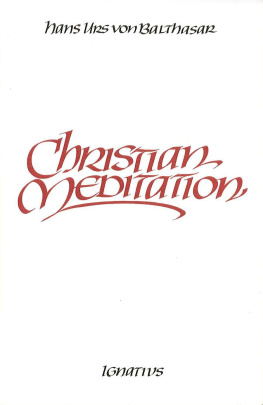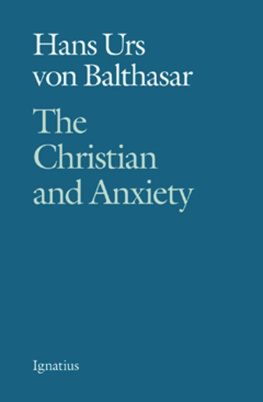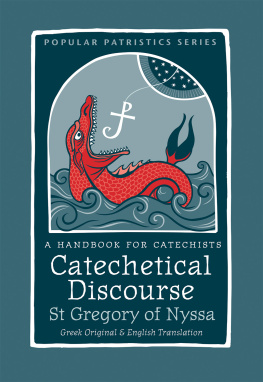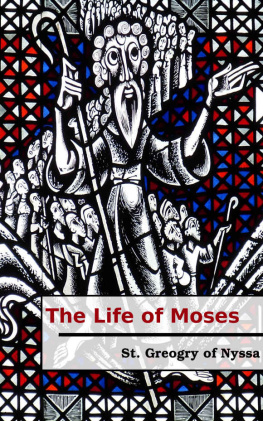PRESENCE AND THOUGHT
HANS URS VON BALTHASAR
Presence and Thought
Essay on the Religious Philosophy
of Gregory of Nyssa
Translated by Mark Sebanc
A COMMUNIO BOOK
IGNATIUS PRESS SAN FRANCISCO
Title of the French original:
Prsence et pense
Essai sur la philosophic religieuse de Grgoire de Nysse
1988 Beauchesne Editeur, Paris
Cover by Roxanne Mei Lum
1995 Ignatius Press, San Francisco
All rights reserved
ISBN 978-0-89870-521-8
Library of Congress catalogue number 94-79302
Printed in the United States of America
CONTENTS
PART ONE
The Philosophy of Becoming and Desire
PART TWO
The Philosophy of Image
PART THREE
The Philosophy of Love
If all things were within our grasp,
the higher power would not be beyond us.
Gregory of Nyssa
FOREWORD
The situation of the theologian in todays world is strangely paradoxical. In terms of vocation, he is devoted to a study of the past, where God has manifested himself. Even beyond this study of the past, though, he is a man devoted to a contemplation of the Eternal. But by the very fact of his existence, he is immersed in a world that is teetering on its foundations and seems ready to collapse. Very much absorbed as he may be by prayer and his professional research, if he has taken any trouble at all to look around him and to rise high enough above the fray to seek to understand what is happening, he cannot but think that he belongs to an epoch, as Pguy said, not to a period. He belongs to an epoch where the established order, to all outward appearances still solid, is in reality sapped from within, deserted already by a life that can at any given moment reject it and, transformed, leave it like an empty shell destined to turn to dust at the slightest breeze. Undoubtedly there remains for him the contemplation of the eternal verities. He knows well enough that they, at least, do resist the tumultuous storms of our time. Does he not, however, know quite as vividly that these eternal verities, in order to be living and activereal and true in both an earthly sense and a heavenly sense at the same timemust be incarnated in temporal forms?
But where are these temporal forms to be found? The historical period that was inaugurated by Descartes is ended. How will the theologian be able to work at the task of bringing to birth and nurturing a theology that will be reclaimed by a new humanity? As for this new humanity, we can catch glimpses here and there of its lineaments. But its contours remain so blurred, its internal structure so embryonic, that one would risk making enormous and fruitless mistakes in conceiving a wish to describe it prophetically, rather than waiting for its slow maturation and perhaps, as well, the profoundly disruptive disorders and sudden catastrophes that will liberate it from an overly oppressive and haunting past.
In a present that is so ambiguous, between a death that is being consummated and a life that is being born, what can the theologian do? What ought he to do? His first move will be to return once more to the past. This return will be beneficial, but only on one condition: that he understand well that history, far from dispensing us from creative effort, imposes it on us. Our artists, and in particular our architects, all acknowledge this. A Greek temple, a Romanesque church, a Gothic cathedral all merit our admiration, because they are witnesses to a beauty and truth that are incarnate in time. But to reproduce them now in our present day would constitute an anachronism, all the more appalling to the extent the copies were more minutely exact. The intent to revive them, to adapt them to the needs of the time, would be even worse. Such an effort could only beget horrors. All attempts at adaptation to current tastes are doomed to the same fate. No more than architecture does theology escape this universal law. In neo-Greek style, the column of antiquity loses its original qualities of simplicity and becomes an intolerable imitation. And the same may be said of Saint Thomas: A great and estimable doctor, renowned, authoritative, canonized, and very much dead and buried (Pguy). We should not imagine that there are other estimable figures who in our eyes are better capable of withstanding such treatment! We have turned our gaze on a more distant past, but we have not done so in the belief that, in order to give life to a languishing system of thought, it would suffice to exhume the Greek Fathers and adapt them for better or worse to the needs of the modern soul. We are not ingenuous enough to prefer a neopatristic theology to a neoscholastic theology! There is never a historical situation that is absolutely similar to any of the ones that preceded it in time. Thus there is no historical situation that can furnish us with its own solutions as a kind of master key capable of resolving all the problems that plague us today. When it comes to shaping ones personal behavior, all the rules of morality, as precise as they may be, remain abstract in the face of the infinite complexity of the concrete. Even when these rules of morality are applied to cases of conscience where they are limited in scope and complement one another reciprocally, the fact that they are combined with one another means that they cannot provide an exact coincidence with a human situation, which is always susceptible to an infinite analysis. If one goes right to the limits of the thing, from rules of conduct to a conduct that is regulated, there always subsists a gap that can only be surmounted by the decision of a love that is free. The same is true of theology. As precise as one may suppose it to be, the history of dogma will never yield more than fragmentary formulas that will never provide a decisive, ready-made solution to the difficulties of our contemporary situation, a situation that is entirely unique!
Without a doubt, the theologian may appeal for help to tradition, which the Catholic Church makes use of in her struggle against all forms of theological individualism and Protestantism. But it is important to understand exactly what this tradition is, so that we may know what we can expect from it and what it absolutely cannot give us. One would be quite mistaken to imagine it as a relay of runners, each of whom, at the end of his segment of the race, hands off the witness, the message, a piece of wood, or a written work that, through space and time, is preserved of itself in its immovable materiality. If there were indeed a witness and a message to preserve, a more correct image would be that of the torch, as in the Olympic races of antiquity. For even while it remains identical to itself, a living flame can lay claim to being protected, at every moment, against a constant succession of dangers and being sustained by a substance that is ever new. In very truth, this living Flame is that of the Spirit of love, who, having come down from heaven to the Holy Land, is jealously preserved by the Church and transmitted by her through all human generations in order to inflame the world. Tradition, therefore, is the very consciousness of the Church and, in a more particular way, her memory, in which are accumulated the experiences of her sons and daughters, who succeed in keeping the sacred deposit alive and intact in an incredibly diverse panoply of situations. The treasure-house of these memories is at the disposal of the theologian in the same way that the storehouse of his lived experiences is available to the individual. But it is evident that recalling the problems and solutions of the past does not admit, for either the theologian or the individual, of a literal resumption of previous solutions and their mechanical application to the difficulties of the present. For a new problem there must be a new solution. Without a doubt, between these two variable conditions of past and present there always subsists an identity of relationship. But precisely because the second of these terms is always different from what it was up to the present moment, the formal identity of relationship cannot be preserved by the purely material repetition of the first term. To unravel each one of the problems that life poses for him, man must also act each time according to an immanent rule in such a way as to maintain, in the midst of the most diverse situations, the coherence of his own personality. He will succeed in this only on the condition that he discover a new attitude each time. Only those who change remain akin to me, said Nietzsche. Without giving way to any kind of superficial relativism, one may even apply these words to the life of the Church herself. In order to remain faithful to herself and her mission, the Church must continually make an effort at creative invention. Paul had to be inventive in order to cope with the problem of the Gentiles who were obliged to enter into a Church that was heir to the Synagogue. The same applies to the Greek Fathers in the face of Hellenistic culture, and also to Saint Thomas in the face of Arabic philosophy and knowledge. We, indeed, for our part, must do the same in the face of the problems of our day.
Next page
